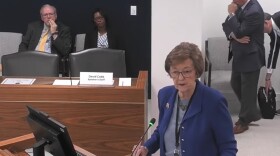House Speaker Tim Moore says budget delays will now extend until next month. He told reporters Monday that scheduling conflicts will likely prevent lawmakers from passing the budget bill until after Labor Day.
“At this point, you’re talking about a September date for actual passage — signing into law and all of that. I think you should have significant progress made in the next couple of weeks, so you have a pretty good idea of what it’s going to be,” he said.
The budget will be at least two months late under that timeline. Moore says he’s meeting with Senate leaders this week to resolve about 70 remaining points of disagreement in the $30 billion spending plan. He said it’s an improvement from the more than 100 items that were left to negotiate last week.
The delay could mean that Medicaid expansion is postponed by several more months. The N.C. Department of Health and Human Services had hoped to launch the health care program on Oct. 1 for more than 600,000 people who hadn’t previously qualified.
“If NCDHHS does not have authority to move forward by Sept. 1,” through an enacted budget or through separate Medicaid legislation, “the earliest fallback date is Dec. 1, 2023, and depending on how late authority is given, it could fall into 2024,” DHHS spokeswoman Kelly Haight Connor said in an email Monday.
The budget delays come as North Carolina officials announced Monday that state government ended the fiscal year in June with a $3 billion surplus.
The Office of State Budget and Management says agencies ended up with $1.17 billion in unspent budgeted funds — due in part to the 20% vacancy rate in the state government workforce.
"Our state employees have demonstrated incredible stewardship and resilience in the face of changing budgetary pressures and unprecedented vacancies,” State Budget Director Kristin Walker said in a news release.
Legislative leaders have agreed on state employee pay raises that they hope will address the vacancy problem, but they haven’t released details.
Moore would only say that the raises in the budget “are significant, they’re meaningful, they are designed to reward teachers and state employees. They are designed to try to do more than just keep up with the inflation that we are dealing with.”
The raises will be retroactive, meaning that whenever the budget is enacted, state workers will get the amount they would have earned if the raises took effect July 1. State retirees would also see a pension increase, but Moore wouldn't say if it's a permanent cost-of-living increase or a one-time bonus.
Sen. Ralph Hise, R-Mitchell and a Senate budget writer, said the surplus announced this week wouldn’t impact the ongoing negotiations because lawmakers had already agreed on a total amount to spend this year. Democrats, however, have said that total is too low and leaves more unspent than the state needs in reserves.
The House and Senate aren’t planning to hold any voting sessions until Wednesday, Aug. 16. That’s when the House has scheduled veto override votes on bills ranging from transgender health care to building code regulations.








